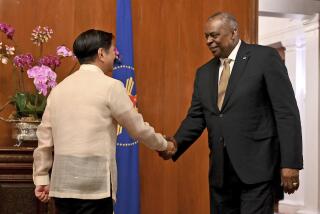Marine’s Murder Fuels Fear of More Violence : Philippines: U.S. officials worry that leftists will keep attacking Americans to protest foreign bases on their soil.
- Share via
MANILA — U.S. officials said Sunday that they fear additional attacks on American diplomats or military personnel in the Philippines following the shooting death of a U.S. Marine sergeant by suspected Communist assassins outside Subic Bay Naval Base.
With sensitive talks due to begin May 14 on the future of the six U.S. military facilities in the Philippines, the officials fear the Friday night shooting may signal a new campaign of leftist violence to force the bases out.
“The expectation is this attack will be followed by others in the next several weeks,” one analyst said Sunday.
Said a second official: “Everybody is very nervous.”
About 40,000 U.S. military personnel, civilian base workers and their families remained confined to their bases Sunday, and Subic Bay spokesman Lt. Cmdr. Kevin Mukri said that Americans connected to the Defense Department who live off the bases were ordered not to stop while driving to and from work.
The U.S. Embassy warned American tourists and business travelers to stay away from U.S. installations and from more than a dozen rural provinces. Officials also restricted travel for about 300 Peace Corps workers in the country.
“We’re trying to alert American citizens of the increased risk,” Victoria Middleton, an embassy spokeswoman, said.
Officials here said the State Department is considering adding the Philippines to its list of “most dangerous” countries for U.S. diplomats. The list now includes Lebanon, Afghanistan, El Salvador, Colombia and Peru.
The designation, which would add 20% hazardous-duty pay for about 400 diplomats, could have political ramifications since the Bush Administration remains committed to President Corazon Aquino’s struggling four-year-old government.
Several U.S. diplomats have been transferred or have sent their families home in recent months because of the increased threats. For security, embassy officials now are urged to vary their routes when they go to work, to change license plates, use different cars or ride in armored embassy vehicles.
By early today, no group had claimed responsibility for the killing of Gunnery Sgt. John S. Fredette, 34, of Buena Park, Calif., who was shot once in the back of the neck. But police and U.S. Embassy officials said they strongly suspect the New People’s Army. The Communist group had repeatedly threatened to attack American officials before the talks and had named Subic Bay as a target.
Tensions were heightened last week after tens of thousands of people marched against the U.S. bases in annual May Day demonstrations. The protests drew widespread publicity after Philippine military police severely beat several protesters and local reporters at the gates of Clark Air Base.
Clark and Subic Bay are among America’s largest overseas bases.
Fredette was killed as he walked down a dimly lit residential street near the raucous nightclub district in Olongapo, about 50 miles northwest of Manila. He had arrived at Subic Bay one week earlier on a training mission with Marine Fighter/Attack Squadron 323 based in El Toro, Calif.
“He was not robbed, so that makes it more likely it was a political murder,” one analyst said. “It looks like the poor guy was in the wrong country at the wrong time.”
In the past, the Communist rebels had said they would target only those Americans involved with counterinsurgency or intelligence operations. Analysts said the latest shooting suggests that enlisted men and women may be targets now as well.
If the rebels were responsible, Fredette would be the sixth American killed by guerrillas since Army Col. James (Nick) Rowe, a counterinsurgency expert, was assassinated in suburban Quezon City in April, 1989.
More to Read
Sign up for Essential California
The most important California stories and recommendations in your inbox every morning.
You may occasionally receive promotional content from the Los Angeles Times.














